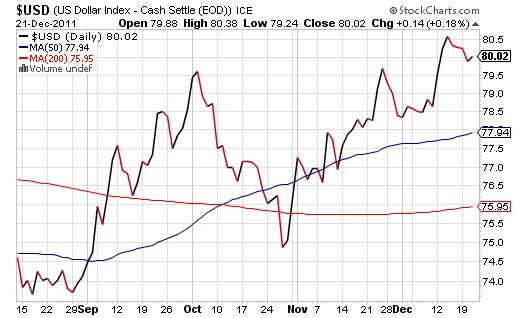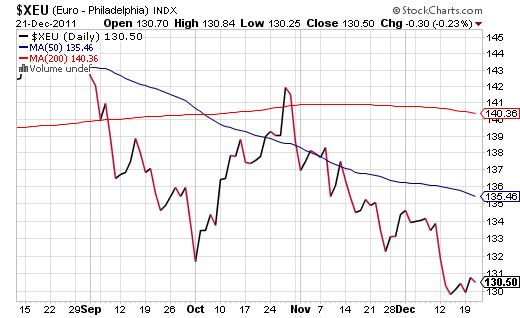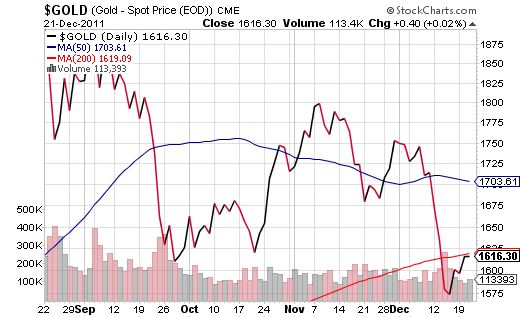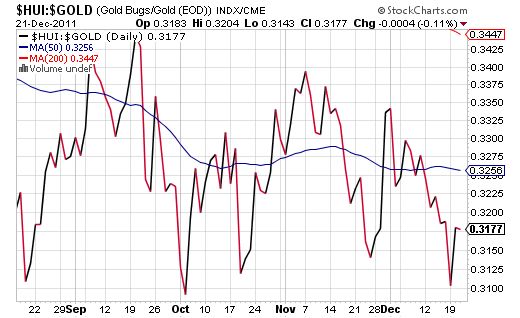What's Up with Gold Mining Stocks?
Commodities / Gold & Silver Stocks Dec 22, 2011 - 12:22 PM GMTBy: Ron_Hera
 Claims that the gold bull market has ended are incorrect. One of the main causes of recently lower precious metals prices is the fact that the U.S. dollar has strengthened against the Euro. Since the U.S. dollar is the world reserve currency, a stronger dollar lowers the U.S. dollar prices of global commodities. Also, financial flights to safety, e.g., out of the Euro or European sovereign bonds, temporarily increase demand for U.S. dollars and U.S. Treasuries, strengthening the U.S. dollar against other currencies and lowering U.S. Treasury yields.
Claims that the gold bull market has ended are incorrect. One of the main causes of recently lower precious metals prices is the fact that the U.S. dollar has strengthened against the Euro. Since the U.S. dollar is the world reserve currency, a stronger dollar lowers the U.S. dollar prices of global commodities. Also, financial flights to safety, e.g., out of the Euro or European sovereign bonds, temporarily increase demand for U.S. dollars and U.S. Treasuries, strengthening the U.S. dollar against other currencies and lowering U.S. Treasury yields.

As the great American author and humorist Mark Twain famously said in 1887, "the report of my death was an exaggeration." Most analysts believe that the Euro project has failed, which is to state the obvious. Nonetheless, the Euro isn't dead until European banks, the European Central Bank (ECB) and European political leaders decide to end it. However, they will not let it end in the foreseeable future.

European sovereign defaults, if they were allowed to occur, would not require the European Monetary Union (EMU) to end, although the Treaty of Maastricht would have to be amended. What is far more important is that there is no way to allow sovereign defaults, or to break up the EMU, while also salvaging the Euro-denominated debts of countries exiting the EMU. Breaking up the Euro would impact fragile European banks and that is simply the end of the discussion. The United States led the way into the brave new too-big-to-fail world in 2008 and "too big to fail" remains the underlying policy of Western governments. Setting aside the resulting economic catastrophe and growing social and political chaos in Europe, the current situation will continue.
Gold closed under $1,600 U.S. per ounce during the week of December 11, leading to the COMEX options expiration of December 17. In terms of the gold price, there may be a risk of a disconnection between the Commodities Exchange (COMEX) futures prices and physical supply and demand outside of the futures market. The COMEX, which is operated by the CME Group (linked to the MF Global debacle), could experience a liquidity drain due to fears over market integrity, resulting in a net liquidation of futures contracts. The Commitments of Traders (COT) report for the week ended December 13 showed that speculative long positions fell by 8,284 contracts while short positions rose by 924 contracts. Future COT reports (e.g., for the week ending December 23) might show larger changes.

Those seeking to invest in precious metals are likely to prefer alternatives to futures contracts, such as physical bullion, Exchange Traded Funds (ETFs) or mining shares. If the futures price of gold remains depressed while physical demand remains robust, premiums over spot for physical metal will rise and, at some point, might re-price the metal outside of the COMEX, making the COMEX (and London Bullion Market Association) price less relevant.
The Euro is set to fall further against the U.S. dollar. Political rhetoric in Europe has indicated a deflationary bias on the part of European Union leaders. German Chancellor Angela Merkel is said to have an absolute phobia of inflation. European Central Bank president, Mario Draghi and Italy's unelected banker-government chief, Mario Monti, are said to be "very German." In fact, Germany has resisted calls for the ECB to launch a U.S. Federal Reserve-style program of buying sovereign bonds (so-called quantitative easing). However, as long as (a) the major European banks are not allowed to fail, and as long as (b) no European government is allowed (by Brussels and by its own major banks) to default, there is no path forward other than inflation.
- No possible combination of economic growth, taxes or budget cuts will allow Greece, Italy or Portugal to repay their debts.
- The sovereign debt of Greece, Italy and Portugal cannot be paid in Euros at their current value.
- The economies of Greece, Italy and Portugal, are simply too weak to support even reduced government spending.
- The governments of Greece, Italy and Portugal cannot service or repay their debt from tax revenue.
- So far, austerity measures and, in the case of Portugal, financial plunder have been ineffective to resolve the debt crisis.
- In the near term, the governments of Greece, Italy and Portugal must continue borrowing or fail.
- Deflation in the Eurozone would crush European exports and, therefore, cause an economic recession.
- A new recession in Europe would definitely affect Germany and cause economic collapse in Greece, Italy and Portugal.
- Ultimately, a significant percentage of European sovereign debt must be written down by banks as a loss.
- Sovereign defaults would trigger an unpredictable domino effect in OTC derivatives, probably resulting in a chain of bank failures.
- European bank failures caused by losses on sovereign bonds would trigger a new, and more severe, financial crisis, including a cascade of OTC derivatives liabilities.
The political rhetoric emanating from Europe is propaganda intended to (a) strengthen the Euro, (b) support demand for European sovereign debt, (c) calm the bond market, and (d) hold the bond vigilante wolf pack at bay. Chancellor Merkel has said that the Euro can be saved "if we have the necessary patience and endurance, if we do not let reversals get us down, if we consistently move toward a fiscal and stability union." However, the time required, assuming that the goal is workable, will cost many billions of Euros in lending or bailouts to otherwise bankrupt sovereigns and banks. The loans and bailouts (and U.S. dollar currency swap lines from the Federal Reserve) are not only inflationary but are purely temporary measures that do nothing to address the root causes of the problem.
The European Union leadership has no solution and is merely kicking the proverbial can down the road in the hope that economies will recover and that banks will become strong enough to survive the inevitable write-downs. In the mean time, inflation is a persistent reality induced by the very same policy makers who are simultaneously denouncing inflation.
As the saga of European sovereign debt drags on, financial markets, responding the dynamics of the U.S. dollar and the Euro, will remain volatile while mercurial investors continue the so called "risk-on, risk-off" approach and while analysts and commentators continue to vacillate between alternatives that include sovereign defaults, the collapse of the Euro, the failure of major European banks, successful interventions (although they will be both inflationary and temporary) and fear of deflation.
Under the circumstances, it is difficult to rationalize the end of the gold bull market. In fact, the higher earnings of producing gold miners have only recently begun to appear in financial results after having been frustrated by higher production costs and other factors.
Ignoring the compounding effects of momentum traders and short selling, mining shares have come under pressure from a planetary alignment of falling metals prices, extreme volatility, seasonal tax loss selling by investors (for Canadians, completed by December 23) and selling by funds, e.g., to cover redemptions. As a result, the shares of many companies are currently trading near 52-week lows and the spread between gold and gold mining stocks is highly significant.

Volatility means that mining stocks are periodically on sale and the drop in the prices of precious metals mining shares represents a value buying opportunity. A savvy strategy at the bottom might be to sell shares of less developed companies where there are losses, i.e., if tax losses are desirable, and to move the remainder into shares of more mature, higher-quality companies that have also fallen in price, but that can be expected to rebound vigorously.
About Hera Research
Hera Research, LLC, provides deeply researched analysis to help investors profit from changing economic and market conditions. Hera Research focuses on relationships between macroeconomics, government, banking, and financial markets in order to identify and analyze investment opportunities with extraordinary upside potential. Hera Research is currently researching mining and metals including precious metals, oil and energy including green energy, agriculture, and other natural resources. The Hera Research Newsletter covers key economic data, trends and analysis including reviews of companies with extraordinary value and upside potential.
###
Articles by Ron Hera, the Hera Research web site and the Hera Research Newsletter ("Hera Research publications") are published by Hera Research, LLC. Information contained in Hera Research publications is obtained from sources believed to be reliable, but its accuracy cannot be guaranteed. The information contained in Hera Research publications is not intended to constitute individual investment advice and is not designed to meet individual financial situations. The opinions expressed in Hera Research publications are those of the publisher and are subject to change without notice. The information in such publications may become outdated and Hera Research, LLC has no obligation to update any such information.
Ron Hera, Hera Research, LLC, and other entities in which Ron Hera has an interest, along with employees, officers, family, and associates may from time to time have positions in the securities or commodities covered in these publications or web site. The policies of Hera Research, LLC attempt to avoid potential conflicts of interest and to resolve conflicts of interest should any arise in a timely fashion.
Unless otherwise specified, Hera Research publications including the Hera Research web site and its content and images, as well as all copyright, trademark and other rights therein, are owned by Hera Research, LLC. No portion of Hera Research publications or web site may be extracted or reproduced without permission of Hera Research, LLC. Nothing contained herein shall be construed as conferring any license or right under any copyright, trademark or other right of Hera Research, LLC. Unauthorized use, reproduction or rebroadcast of any content of Hera Research publications or web site, including communicating investment recommendations in such publication or web site to non-subscribers in any manner, is prohibited and shall be considered an infringement and/or misappropriation of the proprietary rights of Hera Research, LLC.
Hera Research, LLC reserves the right to cancel any subscription at any time, and if it does so it will promptly refund to the subscriber the amount of the subscription payment previously received relating to the remaining subscription period. Cancellation of a subscription may result from any unauthorized use or reproduction or rebroadcast of Hera Research publications or website, any infringement or misappropriation of Hera Research, LLC's proprietary rights, or any other reason determined in the sole discretion of Hera Research, LLC. ©2011 Hera Research, LLC.
© 2005-2022 http://www.MarketOracle.co.uk - The Market Oracle is a FREE Daily Financial Markets Analysis & Forecasting online publication.



